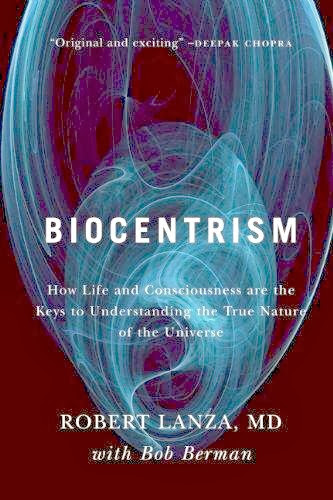Philosophy

by
John Hall
November 15th, 2013
The Independent
It's a question pondered by philosophers, scientists and the devout since the dawn of time: is there an afterlife?
While the religious would argue that life on earth is a mere warm up for an eternity spent in heaven or hell, and many scientists would dismiss the concept for lack of proof — one expert claims he has definitive evidence to confirm once and for all that there is indeed life after death.
The answer, Professor Robert Lanza says, lies in quantum physics — specifically the theory of biocentrism. The scientist, from Wake Forest University School of Medicine in North Carolina, says the evidence lies in the idea that the concept of death is a mere figment of our consciousness.
Professor Lanza says biocentrism explains that the universe only exists because of an individual's consciousness of it — essentially life and biology are central to reality, which in turn creates the universe; the universe itself does not create life. The same applies to the concepts of space and time, which Professor Lanza describes as "simply tools of the mind".
In a message posted on the scientist's website, he explains that with this theory in mind, the concept of death as we know it is "cannot exist in any real sense" as there are no true boundaries by which to define it. Essentially, the idea of dying is something we have long been taught to accept, but in reality it just exists in our minds.
Professor Lanza says biocentrism is similar to the idea of parallel universes — a concept hypothesised by theoretical physicists. In much the same way as everything that could possibly happen is speculated to be occurring all at once across multiple universes, he says that once we begin to question our preconceived concepts of time and consciousness, the alternatives are huge and could alter the way we think about the world in a way not seen since the 15th century's "flat earth" debate.
He goes on to use the so-called double-slit experiment as proof that the behaviour of a particle can be altered by a person's perception of it. In the experiment, when scientists watch a particle pass through a multi-holed barrier, the particle acts like a bullet travelling through a single slit. When the article is not watched, however, the particle moves through the holes like a wave.
Scientists argue that the double-slit experiment proves that particles can act as two separate entities at the same time, challenging long-established ideas of time and perception.
Although the idea is rather complicated, Professor Lanza says it can be explained far more simply using colours. Essentially, the sky may be perceived as blue, but if the cells in our brain were changed to make the sky look green, was the sky every truly blue or was that just our perception?
In terms of how this affects life after death, Professor Lanza explains that, when we die, our life becomes a "perennial flower that returns to bloom in the multiverse". He added: "Life is an adventure that transcends our ordinary linear way of thinking. When we die, we do so not in the random billiard-ball-matrix but in the inescapable-life-matrix."
Professor Lanza's theory is explained in full in his book Biocentrism: How Life and Consciousness are the Keys to Understanding the True Nature of the Universe.
Biocentric universe [Wikipedia]

by
Robert Lanza
ISBN-10: 1935251740
ISBN-13: 978-1935251743
- 6. Eliminative Materialism
What is eliminative materialism? Please elaborate. Some scientists try to get a better understanding of consciousness with the process of eliminative materialism. If they can not understand a phenomenon with the use of mathematics, they use academic...
- Week Two: Natural Philosophy
FILM: QUANTUM THINKING The film asks what is real. When we observe objects you do not sufficiently define it because we do not fully understand it. As the film states, we are "invariably altering what we are examining." We form our own opinions that differs...
- Brian Greene - Why Is Our Universe Fined-tuned For Life?
Have you noticed that wherever Brian Greene goes, computer animations go with him? Well, this TEDTalk presentation is no exception :) I'm starting to wonder whether this might be the physicist equivalent of a comfort blanket... In any case,...
- Non-universal Laws Of Physics
I have advocated this for years. We do not know with certainty that the physics we observe and use are truly universal...and may never know. "Laws of physics 'are different' depending on where you are in the universe" Laws we know may be 'like...
- Universal Laws Of Physics--maybe Not So Universal
I have advocated this for years. It is a logical fallacy to assume that the laws of physics as we observe them are universal. It may well be something we can never test. We would have to test every section of the universe and that is physically impossible....
Philosophy
No evidence, no cigar...Robert Lanza's biocentric universe and the afterlife

"Is there an afterlife? Science can prove there is, quantum physicist claims"
by
John Hall
November 15th, 2013
The Independent
It's a question pondered by philosophers, scientists and the devout since the dawn of time: is there an afterlife?
While the religious would argue that life on earth is a mere warm up for an eternity spent in heaven or hell, and many scientists would dismiss the concept for lack of proof — one expert claims he has definitive evidence to confirm once and for all that there is indeed life after death.
The answer, Professor Robert Lanza says, lies in quantum physics — specifically the theory of biocentrism. The scientist, from Wake Forest University School of Medicine in North Carolina, says the evidence lies in the idea that the concept of death is a mere figment of our consciousness.
Professor Lanza says biocentrism explains that the universe only exists because of an individual's consciousness of it — essentially life and biology are central to reality, which in turn creates the universe; the universe itself does not create life. The same applies to the concepts of space and time, which Professor Lanza describes as "simply tools of the mind".
In a message posted on the scientist's website, he explains that with this theory in mind, the concept of death as we know it is "cannot exist in any real sense" as there are no true boundaries by which to define it. Essentially, the idea of dying is something we have long been taught to accept, but in reality it just exists in our minds.
Professor Lanza says biocentrism is similar to the idea of parallel universes — a concept hypothesised by theoretical physicists. In much the same way as everything that could possibly happen is speculated to be occurring all at once across multiple universes, he says that once we begin to question our preconceived concepts of time and consciousness, the alternatives are huge and could alter the way we think about the world in a way not seen since the 15th century's "flat earth" debate.
He goes on to use the so-called double-slit experiment as proof that the behaviour of a particle can be altered by a person's perception of it. In the experiment, when scientists watch a particle pass through a multi-holed barrier, the particle acts like a bullet travelling through a single slit. When the article is not watched, however, the particle moves through the holes like a wave.
Scientists argue that the double-slit experiment proves that particles can act as two separate entities at the same time, challenging long-established ideas of time and perception.
Although the idea is rather complicated, Professor Lanza says it can be explained far more simply using colours. Essentially, the sky may be perceived as blue, but if the cells in our brain were changed to make the sky look green, was the sky every truly blue or was that just our perception?
In terms of how this affects life after death, Professor Lanza explains that, when we die, our life becomes a "perennial flower that returns to bloom in the multiverse". He added: "Life is an adventure that transcends our ordinary linear way of thinking. When we die, we do so not in the random billiard-ball-matrix but in the inescapable-life-matrix."
Professor Lanza's theory is explained in full in his book Biocentrism: How Life and Consciousness are the Keys to Understanding the True Nature of the Universe.
Biocentric universe [Wikipedia]

Biocentrism: How Life and Consciousness are the Keys to Understanding the True Nature of the Universe
by
Robert Lanza
ISBN-10: 1935251740
ISBN-13: 978-1935251743
- 6. Eliminative Materialism
What is eliminative materialism? Please elaborate. Some scientists try to get a better understanding of consciousness with the process of eliminative materialism. If they can not understand a phenomenon with the use of mathematics, they use academic...
- Week Two: Natural Philosophy
FILM: QUANTUM THINKING The film asks what is real. When we observe objects you do not sufficiently define it because we do not fully understand it. As the film states, we are "invariably altering what we are examining." We form our own opinions that differs...
- Brian Greene - Why Is Our Universe Fined-tuned For Life?
Have you noticed that wherever Brian Greene goes, computer animations go with him? Well, this TEDTalk presentation is no exception :) I'm starting to wonder whether this might be the physicist equivalent of a comfort blanket... In any case,...
- Non-universal Laws Of Physics
I have advocated this for years. We do not know with certainty that the physics we observe and use are truly universal...and may never know. "Laws of physics 'are different' depending on where you are in the universe" Laws we know may be 'like...
- Universal Laws Of Physics--maybe Not So Universal
I have advocated this for years. It is a logical fallacy to assume that the laws of physics as we observe them are universal. It may well be something we can never test. We would have to test every section of the universe and that is physically impossible....
